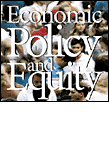Economic Policy and
Equity

Should Equity Be a Goal of Economic
Policy?
IMF Staff
During periods of economic expansion, people see their incomes
rise and living standards improve. Even in good times, however, an unfortunate
few may be left behind. When and how should governments intervene to ensure not
only that the size of the pie increases, but that everybody gets a fair
share?
Conference Participants Agree on Key Issues
Vito Tanzi
On June 8–9, 1998, the IMF held a conference on economic
policy and equity at its headquarters in Washington. Despite
a diversity of views that made for lively discussions, the
participants agreed on a number of key policy issues.
Public Spending on Human Development
Sanjeev Gupta, Benedict Clements, and Erwin
Tiongson
Social indicators are improving in many developing countries as
public spending on education and health increases. But a greater share of
investment in human capital should be channeled toward primary education and
preventive health care.
Asian Crisis

How Has the Asian Crisis Affected Other
Regions?
IMF Area Department Directors
The Asian crisis was the cover theme of the June issue of Finance & Development, which included several articles on various aspects of this
topic. It is now possible to provide a preliminary assessment of the impact of
the crisis on the rest of the world. The directors of the IMF's five
departments covering regions outside Asia provide brief assessments of how the
Asian crisis has affected those regions during the past year.
Mitigating the Social Costs of the Asian
Crisis
IMF Staff
A preliminary analysis of the impact of the Asian crisis shows
that poverty could increase significantly in Indonesia, Korea, and Thailand.
These countries' IMF-supported programs incorporate many measures to mitigate
the effects of the crisis. But if the crisis deepens, additional policy options
will need to be considered.
|  |
Transition
Countries

Ten Years of Transition: A Progress Report
Patrick Lenain
It has been nearly ten years since the countries of Central and
Eastern Europe and the former Soviet Union began the transition to a market
economy. The radical changes required have made the process difficult and, at
times, painful. Progress has been remarkable in a number of countries. But in
others, successful market economies have not yet emerged.
The Post-Communist Transition: Patterns and
Prospects
Julian Exeter and Steven Fries
Most formerly centrally planned economies have laid the
foundations for a market economy. Their future development will depend on how
they respond to the challenges of the next phase of transition: developing the
public and private institutions—in particular, a strong financial
sector—needed in a healthy market economy.
Energy Tax Reform in Russia and Other Former Soviet Union
Countries
Dale Gray
The taxation of oil and gas production and consumption has become
an important fiscal issue in most countries of the former Soviet Union. How can
these countries modify the taxation of their energy sectors to increase fiscal
revenues, improve efficiency, and encourage foreign investment?
Dealing with Azerbaijan's Oil Boom
Christoph B. Rosenberg and Tapio O. Saavalainen
How can transition countries in the Caspian Sea region and
Central Asia that are rich in natural resources manage them to maximum
advantage, while limiting the risks they pose?
Other Topics

Harry Dexter White and the International Monetary
Fund
James M. Boughton
Harry Dexter White profoundly influenced both the design of the
IMF and its development, yet his important work is not widely appreciated
today. The fiftieth anniversary of his death offers an opportunity to review
his accomplishments and career.
The IMF Meets Civil Society
Jan Aart Scholte
The International Monetary Fund is an organization of its member
countries, and its primary relationships are with governments. However, it also
conducts a dialogue with civil society. Both the IMF and civil society have
much to gain from developing this dialogue. |
